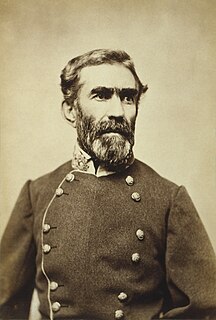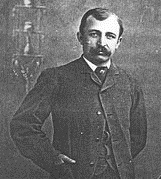 W
WHenry Edwin Baker Jr. was the third African American to enter the United States Naval Academy. He later served as an assistant patent examiner in the United States Patent Office, where he would chronicle the history of African-American inventors.
 W
WBraxton Bragg was an American army officer during the Second Seminole War and Mexican–American War and later a Confederate army officer who served as a general in the Confederate Army during the American Civil War, serving in the Western Theater. His most important role was as commander of the Army of Mississippi, later renamed the Army of Tennessee, from June 1862 until December 1863.
 W
WGeorge J. F. Clarke was one of the most prominent and active men of East Florida during the Second Spanish Period. As a friend and trusted advisor of the Spanish governors of the province from 1811 to 1821, he was appointed to several public offices under the colonial regime, including that of surveyor general.
 W
WNeal Dow was an American Prohibition advocate and politician. Nicknamed the "Napoleon of Temperance" and the "Father of Prohibition", Dow was born to a Quaker family in Portland, Maine. From a young age, he believed alcohol to be the cause of many of society's problems and wanted to ban it through legislation. In 1850, Dow was elected president of the Maine Temperance Union, and the next year he was elected mayor of Portland. Soon after, largely due to Dow's efforts, the state legislature banned the sale and production of alcohol in what became known as the Maine law. Serving twice as mayor of Portland, Dow enforced the law with vigor and called for increasingly harsh penalties for violators. In 1855, his opponents rioted and he ordered the state militia to fire on the crowd. One man was killed and several wounded, and when public reaction to the violence turned against Dow, he chose not to seek reelection.
 W
WNeil Erickson was a Swedish-born American pioneer in Cochise County, Arizona. He and the members of his family were the founders and operators of Faraway Ranch now in the Faraway Ranch Historic District of the Chiricahua National Monument in the Chiricahua Mountains in southern Arizona.
 W
WHenry Ossian Flipper was an American soldier, engineer, former slave and in 1877, the first African American to graduate from the United States Military Academy at West Point, earning a commission as a second lieutenant in the United States Army. He was also an author who wrote about scientific topics and his life experiences.
 W
WJohn Charles Frémont or Fremont was an American explorer, military officer, and politician. He was a U.S. Senator from California, and in 1856 was the first Republican nominee for President of the United States. He was an opponent of slavery.
 W
WAbraham Godwin Jr. was the first Lieutenant of the expedition to Canada in 1812 led by Generals Brown and Izard. He later rose to the rank of Brigadier General in the New Jersey state militia. In 1816 when his eldest brother Henry committed suicide, he became Postmaster of Paterson, a position he would hold until 1829, and briefly again before his death in 1849. In 1821, he was elected to the New Jersey General Assembly, of which he served until 1832. In November 1840, Abraham was tasked to take the New Jersey votes to Washington, D.C. for the Presidential Election.
 W
WWilliam Hallett Greene or Green was the first black member of the U.S. Signal Corps, the first black graduate of City College of New York, and first black meteorologist.
 W
WGeorge Washington Kirk was a soldier who served in American Civil War. Born and raised in Tennessee, he married Maria Louisa Jones in 1860. At the start of the war he served in the Confederate States Army, but his views were Unionist and he left the state to join the Union Army. Advancing to the rank of colonel, in 1864 he raised the 3rd North Carolina Mounted Infantry (Union) and led many raids into North Carolina. Because of the regiment's guerrilla-like tactics, the regiment became known as Kirk's Raiders.
 W
WBrevet Brigadier General George Talcott was a career officer in the United States Army and served as the 3rd Chief of Ordnance of the U.S. Army.
 W
WPhilippe Régis Denis de Keredern de Trobriand was a French aristocrat, lawyer, poet, and novelist who, on a dare, emigrated in his 20s to the United States, settling first in New York City. During the American Civil War, he became naturalized, was commissioned and served in the Union Army, reaching the rank of general.
 W
WGeorge Calvert Yount was a trapper in William Wolfskill's party from New Mexico and came to California in 1831. He was the first Euro-American permanent settler in the Napa Valley, where he was the grantee of two Mexican land grants. Yountville, California is named for him.